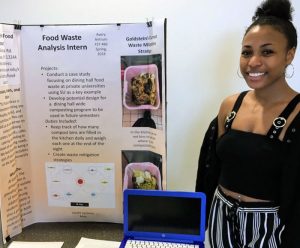
An Interview with Avery Antrum
Where did you complete your internship? What was your title (if you had one)? Briefly, what did your internship entail?
I completed my internship at Goldstein Food Court as a Food Waste Analyst Intern. As an intern here, I developed a case study about daily food waste in university dining halls using Goldstein as case study. In addition to this, I also assisted in the redevelopment of the dining hall wide composting initiative that my supervisor wants to implement in future years at the university.
What did you enjoy most about your experience?
I really liked being able to work independently in a typically busy setting and do hands on work with tracking the exact amounts of waste produced in the kitchen each day. It was also interesting to learn about Goldstein’s enthusiasm about getting more involved with the SU’s sustainability programs.
Talk about a challenging or new experience you faced during your internship, how you managed it, and what you learned as a result.
The most challenging aspect of my internship was realizing how much the average student doesn’t actually care about food waste. With this being an issue I’m very passionate about, it was definitely disappointing to see little to no change in student behavior but it taught me that some subjects like waste, are topics that people need to be eased into in order to fully get their attention and keep them involved.
How did this internship prepare you to work in the broad field of Food Studies?
Goldstein prepared me for work in the broad field of food studies through its exposure to various aspects of the food system in one setting. I had the opportunity to do everything from placing produce orders based on customer consumption and demand, to examining food production and food waste. This internship kind of worked as a basic introduction parts of the food studies field.
What’s next for you?
I hope to be able to work directly with waste reduction, sustainability projects, or community outreach and nutrition education.
